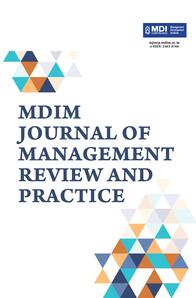
1Adamas University, Barasat, Kolkata, West Bengal, India
2 Department of Business Management, University of Calcutta, Kolkata, West Bengal, India
Creative Commons Non Commercial CC BY-NC: This article is distributed under the terms of the Creative Commons Attribution-NonCommercial 4.0 License (http://www.creativecommons.org/licenses/by-nc/4.0/) which permits non-Commercial use, reproduction and distribution of the work without further permission provided the original work is attributed.
This paper analyses in detail, the Swadeshi enterprises/institutions of Bengal that were established during British rule. The study focuses on the present status, (as of 2019), of the Swadeshi enterprises of Bengal for the period between 1820s and 1947. Data consisting of 1946 Swadeshi enterprises, segregated into 26 different categories/sectors, has been collected using secondary sources. The survival status of the Swadeshi enterprises has been analysed based on the nature of technology used in the production process and the production objectives of the Swadeshi firms. To understand the dominant traits of the current owners of the presently active Swadeshi firms based on entrepreneurs’ social identity, primary data have been collected, with a set of questionnaires, by the in-depth direct interview of at least one owner of each 26 different categories of industries documented in the study of the surviving Swadeshi entrepreneurs.
Swadeshi entrepreneur, Bengal industry, indigenous technology, social identity, Bengal partition
Alsos, G. A., Clausen, T. H., Hytti, U.,& Solvoll, S. (2016). Entrepreneurs’ social identity and the preference of causal and effectual behaviours in start-up processes. Entrepreneurship & Regional Development, 28(3–4), 234–258. https://doi.org/10.1080/08985626.2016.1155742
Bagchi, A. K. (1972). Private investment in India 1900-1939. Cambridge University Press.
Bhattacharya, A. (2005). Heterogenity of the Indian bourgeoisie in colonial India: A comparative study. Business, Politics and Technology, Readers Service.
Bhattacharya, A. (2007). Swadeshi enterprises of Bengal 1900-1920. Setu Prakashani.
Bhattacharya, A. (2014). Swadeshi enterprises of Bengal 1920-1947. Setu Prakashani.
Biswakarma,. (n.d.). Lokkhir Kripalabh, Bangalir Sadhona.
Fauchart, E., & Gruber, M. (2011). Darwinians, communitarians, and missionaries: The role of founder identity in entrepreneurship. Academy of Management Journal, 54(5), 935–957.
Ghosh, B. (1979). Banglar nabajagriti. Orient Longman.
Ghosh, S. (1960). Koler Sohor Kolkata. Bodhi Press.
Hossain, A. (2013). The making and unmaking of Assam-Bengal borders and the Sylhet Referendum. Modern Asian Studies, 47(1), 250–287. https://doi.org/10.1017/S0026749X1200056X
Misra, M. (1999). Business, race, and politics in British India (c 1850–1960). Clarendon Press.
Misra, S. (2004). Spaces, borders, histories: Identity construction in colonial Goalpara [PhD thesis, University of London]. https://eprints.soas.ac.uk/28885/1/10673054.pdf
Ray, T. (2011). The economic history of India 1857-1947. Oxford University Press
Sarkar, S. (2013). Bengali entrepreneurs and western technology in the nineteenth century: A social perspective. Indian Journal of History of Science, 48(3), 447–475. https://insa.nic.in/writereaddata/UpLoadedFiles/IJHS/Vol48_3_4_SSarkar.pdf
Sarkar, S. K. (2014). Technology and rural change in eastern India 1830–1980. Oxford University Press.
Tripathi, A. (1954). Trade and finance in the Bengal Presidency, 1793–1833. Oxford University Press.
Tripathi, D. (2013). The Oxford history of contemporary Indian business. Oxford University Press.